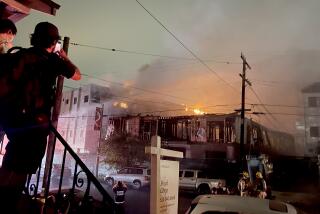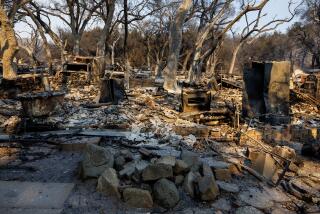Bracing for Wave of Litigation
WEST WARWICK, R.I. — Hours after the nightclub fire here, the legal questions began flooding in.
Children were left orphaned. What was the procedure for custody? Victims without health insurance faced costly and prolonged treatment for burns. Was there emergency protocol to help them? There was rent to be paid, mortgages to meet, car payments to remit. What if victims faced long-term hospitalization? What were they supposed to do for income?
“These questions are going to come up today, yesterday and tomorrow,” said Michael St. Pierre, president of this small state’s tightly knit bar association. “The group that was in this club was relatively young. Many were just getting started in their work fields. They need help now.”
So while the state continued to reel from the Feb. 20 disaster at the Station music club, many in Rhode Island’s 5,000-member legal community prepared for a professional tidal wave.
Attorneys were spotted strolling through the fire site even before the embers had cooled. An editorial cartoon depicted lawyers sky-diving on this town of 30,000 just south of Providence. Radio and newspaper stories warned against rapacious out-of-state attorneys promising fat settlements to vulnerable victims.
“Bottom-dwellers,” said St. Pierre, his voice dripping with distaste.
Last week, while excavators were still digging through the nightclub ruins, about 200 lawyers signed on as volunteers at a resource center set up by the state for fire victims and their families. St. Pierre said that in court Friday, the opposing counsel in a case he was arguing buttonholed him to ask how he could help.
Some survivors, meanwhile, began engaging lawyers via cell phone as they retrieved their cars from the music club’s parking lot. With civil claims that could total more than $500 million and criminal charges that could reach to manslaughter or even second-degree murder, the disaster’s implications staggered even veteran players in Rhode Island’s legal arena.
“There has never been anything like this in Rhode Island,” said John Lynch Sr., a trial lawyer here for 39 years who said he almost certainly will become involved with any proceedings. “There has never been a case of this magnitude in this state.”
The drama is poised to unfold jointly in civil and criminal courts. Sequestered at a National Guard base, a grand jury is investigating the calamity caused by pyrotechnics set off at a concert by the rock band Great White. State, local and half a dozen federal agencies -- including a group called the National Construction Safety Team -- joined in the investigation of a blaze that leveled the crowded club in less than four minutes.
Accusations about who authorized the fireworks flew between club owners Michael and Jeffrey Derderian and the four surviving members of Great White. (Guitarist Ty Longley was among the fatalities.) State and local officials say no permits were issued for the explosives that opened Great White’s act, shortly after 11 p.m.
Charges of involuntary manslaughter are possible, said J. Richard Ratcliffe, a Providence attorney who is active in the National Assn. of Criminal Defense Lawyers. Ratcliffe said state law also provides for charges of second-degree murder in cases where an unlawful act results in someone’s death.
“There are not many charges that are much more serious,” Ratcliffe said.
But despite its terrible toll, the nightclub fire is a legal aberration, Ratcliffe maintained.
“This case doesn’t fit neatly within criminal law, within the things that usually happen within criminal courts,” he said. “Generally, the punishment someone receives is commensurate with the crime. In this case, the unintended consequences are so devastating. But obviously, no one intended for this fire to occur.”
Rhode Island Atty. Gen. Patrick Lynch, who is not related to John Lynch Sr., said in an interview that he has not determined if any laws were broken.
“Justice may ultimately lead to me to conclude that this is just a tragic, horrific accident,” Lynch said. “Or it may lead me to show that one or more people violated the law in one or more different ways that resulted in the deaths and injuries caused to those people and the community at large.”
The prospects for civil lawsuits are no less complicated, said Carl T. Bogus, a professor at Rhode Island’s Roger Williams University Law School. He noted that from death to smoke inhalation, the fire caused a wide range of damage. Some victims could require lifelong care for their injuries, he pointed out. Others may carry crippling psychological scars, he said.
To compensate these victims, “their lawyers quite appropriately will attempt to look for responsible parties that have deep pockets,” said Bogus, who specializes in product liability. Beyond the club owners and band members, Bogus predicted that lawyers likely will focus on the manufacturers of allegedly flammable materials in the club, especially foam soundproofing.
He and others said judgments linked to the fire easily could exceed $500 million.
But where the money to pay that might come from is anybody’s guess, Providence attorney John Calvino said.
“I can’t imagine the club or the band having anywhere near the kind of insurance needed to compensate five victims, never mind 300,” said Calvino, who said he had fire victims calling him within days of the disaster. “If the club had a policy worth $3 [million] to $5 million, that would be great coverage for a place of that size.”
Lawyers for Great White and the Derderians did not reply to calls about insurance coverage.
Bar group president St. Pierre said it was likely that the large number of potential civil cases would be consolidated and heard by one judge.
But, he said, “This is a small state, and this was the fourth-largest [nightclub] fire catastrophe in this country’s history. The amount of these claims, whatever that turns out to be, that value is going to pale in comparison to what is available. To me that is the second tragedy.”
More to Read
Sign up for Essential California
The most important California stories and recommendations in your inbox every morning.
You may occasionally receive promotional content from the Los Angeles Times.










